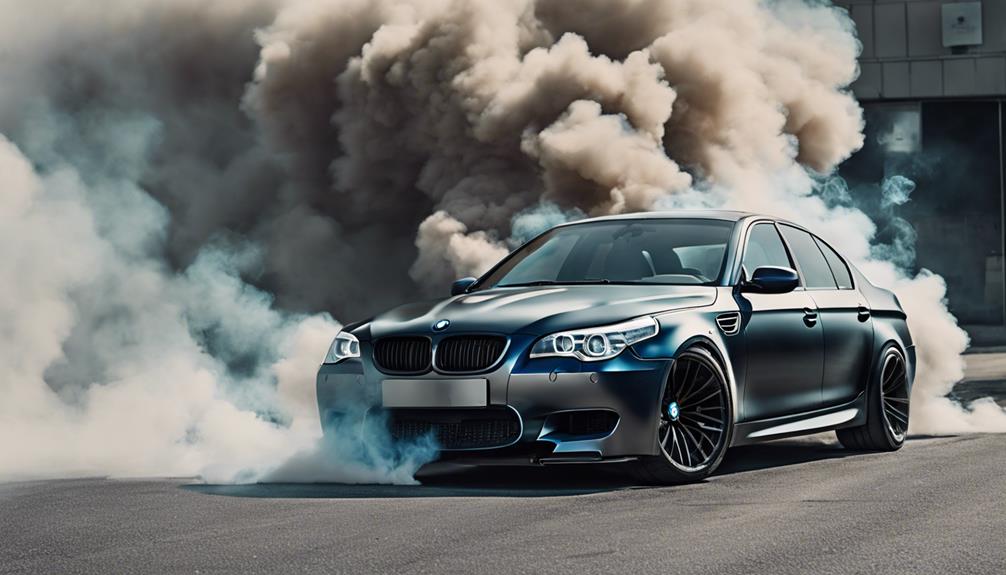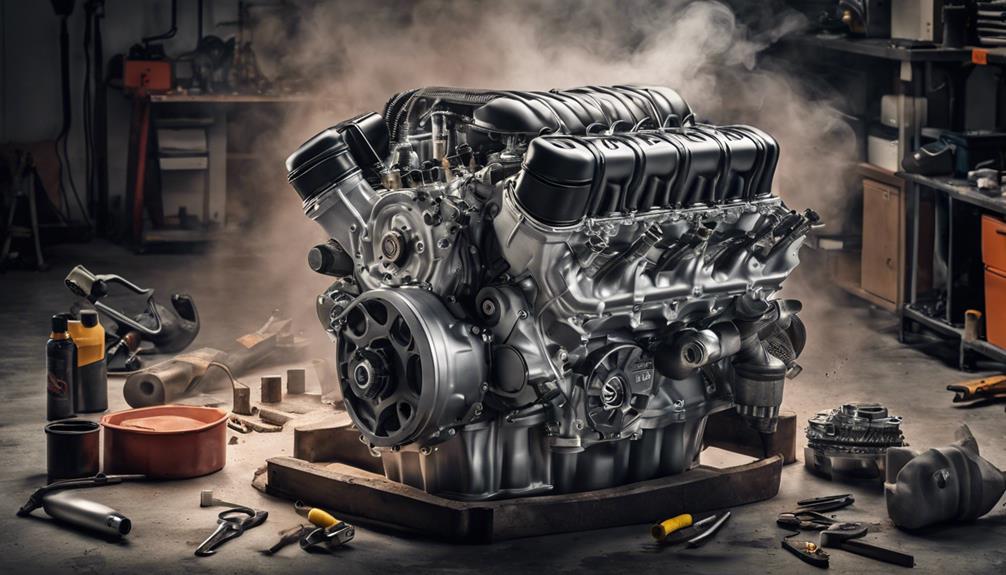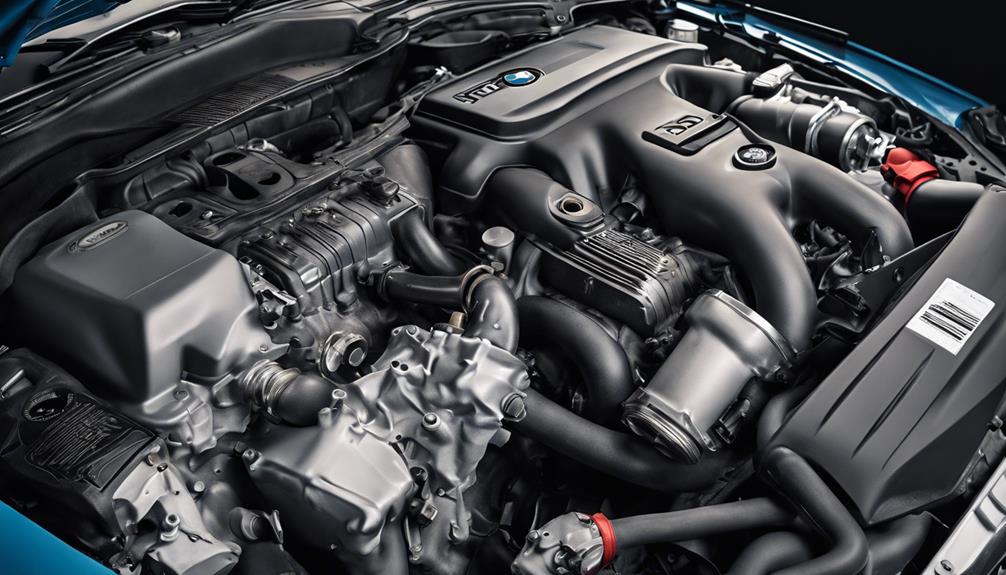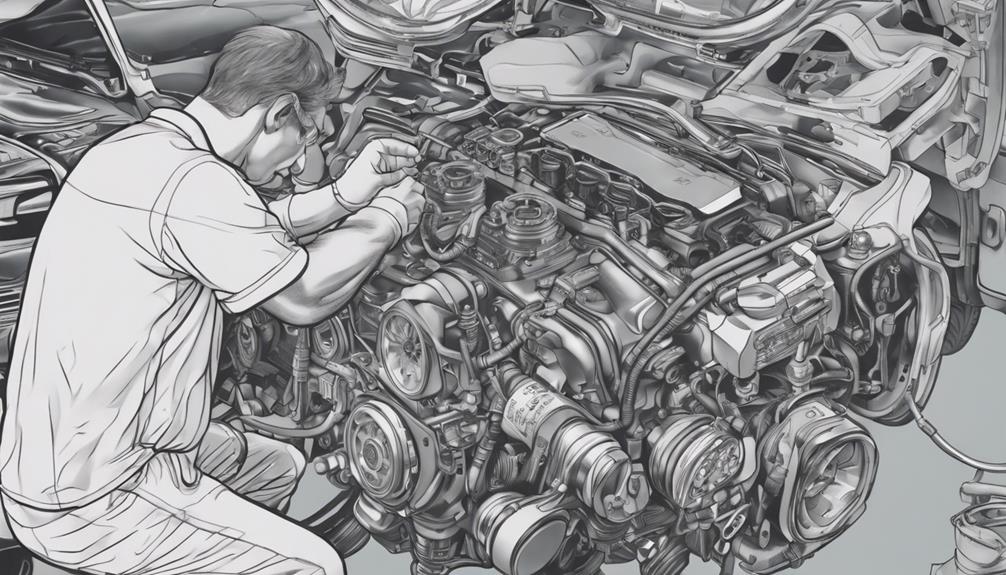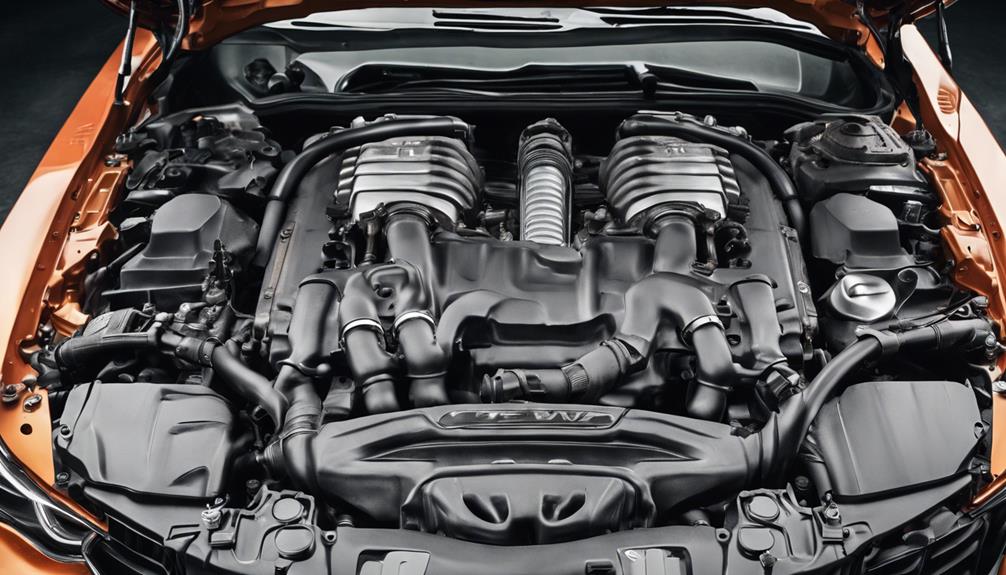If you're eyeing a BMW M5, buckle up for some pricey pitfalls. Brace yourself for the sticker shock of BMW's replacement parts, where OEM reigns supreme but labor costs play a hefty role. Watch out for those sneaky oil leaks, often linked to faulty gaskets and seals that can wreak havoc if left unattended. And don't overlook the possibility of suspension clunks, hinting at worn control arms and bushings. The road ahead could be a bumpy (and costly) one, but hey, there's much more to uncover about the M5's quirks and charms.
Key Takeaways
- Expensive OEM parts contribute to high repair costs.
- Addressing oil leaks promptly prevents engine damage.
- Suspension clunks signal worn components needing attention.
- Reported annoyances include oil leaks and turbocharger issues.
- Stay informed about recalls to ensure safety and compliance.
Expensive BMW Replacement Parts
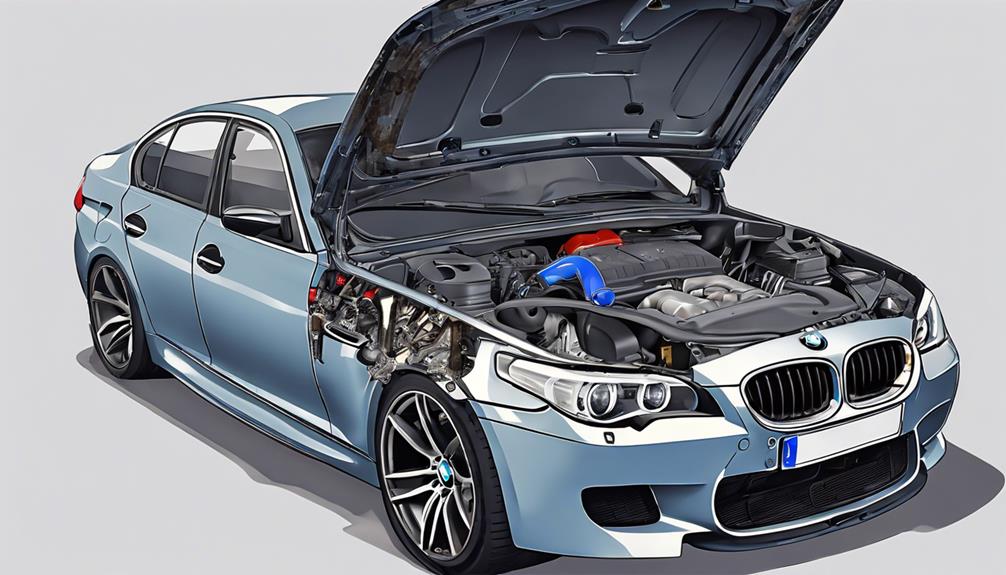
When it comes to owning a BMW M5, be prepared for the sticker shock that comes with purchasing expensive replacement parts. The M5 Forum is a valuable resource for M5 owners who are exploring the world of costly BMW components.
Turbochargers, suspension parts, and specialized electronics are just a few examples of components that can burn a hole in your pocket. Opting for OEM BMW parts over aftermarket alternatives further escalates the bill.
Labor costs for installing these parts add another layer of expense. However, being part of the M5 Forum community can provide you with insights on how to manage these costs effectively.
Oil Leaks
If you're noticing oil spots under your BMW M5, chances are you're dealing with one of the notorious oil leak culprits like the valve cover gaskets or oil filter housing gaskets.
These leaks may seem minor, but neglecting them could spell trouble, leading to engine issues and potential overheating.
Stay on top of maintenance to nip these leaks in the bud and keep your BMW M5 running smoothly.
Causes of Leaks
Oil leaks in BMW M5s often stem from various faulty seals and gaskets, necessitating prompt identification and repair to prevent further complications. When it comes to the causes of oil leaks in your BMW M5, here are some key culprits to look out for:
- Valve Cover Gaskets: These gaskets can deteriorate over time, leading to oil seepage.
- Oil Filter Housing Gaskets: If these gaskets fail, they can result in oil leaks around the oil filter housing.
- Oil Pan Gaskets: A worn-out oil pan gasket can cause oil to leak from the bottom of the engine.
- Rear Main Seals: Failure of the rear main seal can also contribute to oil leaks in your BMW M5.
Identifying and addressing these issues promptly is essential to maintaining your car's performance and reliability.
Repair and Maintenance
Proactive maintenance and swift repairs play a vital role in safeguarding your BMW M5 against potential oil leaks and ensuring its continued peak performance. Oil leaks in BMW M5s often stem from faulty valve cover gaskets, oil pan gaskets, or oil filter housing gaskets.
Detecting and addressing oil leaks early is essential to prevent engine damage, oil contamination, and overheating. Timely repairs for oil leaks can range in cost based on the severity and the specific gasket requiring replacement.
Regular inspection of gaskets and seals is key to avoiding costly engine repairs and maintaining long-term reliability in your BMW M5. Stay ahead of potential oil leak issues to enjoy a smooth and worry-free driving experience with your prized vehicle.
Suspension Clunks

When encountering suspension clunks in your BMW M5, identifying the root cause promptly is essential for maintaining top driving performance and safety. Here are four key points to keep in mind:
- Inspect Suspension Components: Worn out parts like control arms, bushings, or sway bar links are common culprits behind suspension clunks. A thorough examination can pinpoint the exact source of the noise.
- Listen for Symptoms: Knocking or banging noises when going over bumps or turning corners are classic signs of suspension clunks. Pay attention to these sounds to catch issues early.
- Prevent Further Damage: Addressing suspension clunks promptly is vital to prevent damage to other components. Timely action can save you from more extensive repairs down the road.
- Expert Diagnosis and Repairs: Seek professional help to diagnose and repair suspension clunks. From checking for loose parts to potentially upgrading to aftermarket components, experts can make sure your BMW M5 runs smoothly once more.
Reported Annoyances
In the domain of BMW M5 ownership, maneuvering through reported annoyances can offer insights into common issues faced by enthusiasts. When it comes to M cars, minor annoyances like oil leaks and suspension clunks have been known to crop up. While these might seem like pesky problems, they're often manageable and can be rectified with timely maintenance. Owners have also reported occasional recalls for specific components, which can be a hassle but are necessary for ensuring the vehicle's peak performance and safety.
One area where annoyance can turn into a hefty bill is with turbocharger issues. Repairs or replacements can be costly, but the good news is that they're generally accessible for maintenance, providing some relief to M5 owners. Despite these reported annoyances, the overall maintenance and servicing costs for BMW M5 are considered reasonable, making it a feasible choice for those who crave the exhilarating experience that M cars offer.
Additionally, many owners choose to enhance their driving experience by opting for common upgrades like intake and exhaust modifications, adding a personal touch to their M5 while addressing some of these annoyances.
Recalls
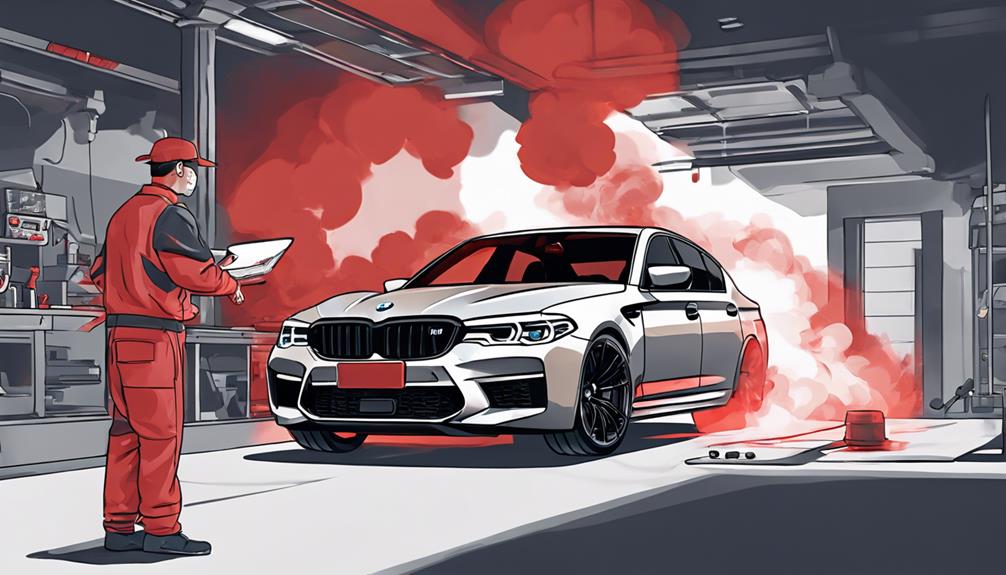
You've probably heard about the recalls affecting BMW M5 models, addressing issues like faulty fuel pumps, airbag inflators, and rear subframe defects.
These recalls can impact specific model years and production periods, requiring owners to take action to address safety or performance-related concerns promptly.
Staying informed about recalls and ensuring they're promptly addressed is essential to maintain the safety and best performance of your BMW M5.
Recall Frequency
Amidst the domain of BMW M5 ownership, the tempo of Recall Frequency orchestrates a symphony of caution and vigilance. Stay attuned to these notes:
- Recalls are like safety concertos, addressing various issues from fuel pumps to software glitches.
- Components like powertrains and airbags take center stage during recall performances.
- The frequency of recalls varies by model year, with some years hitting the high notes with multiple recalls.
- Keep your BMW M5 in tune by promptly addressing recalls through authorized dealerships for harmonious repairs.
Ensuring your M5 is in top condition means dancing to the recall frequency beat, maintaining both performance and safety standards.
Impact on Owners
Exploring the domain of BMW M5 ownership involves remaining vigilant and responsive to recalls that can affect owners by requiring repairs or modifications. Recalls for BMW M5 models aim to address safety issues, emissions compliance, or performance concerns identified by the manufacturer.
Owners may receive notifications through various channels like mail, email, or online portals provided by BMW. Failing to address recalls promptly can pose risks for the driver, passengers, and other road users.
It's essential for BMW M5 owners to stay informed about any recalls impacting their vehicles and take necessary action to guarantee safety and compliance.
Costly Turbo Replacements
Costly turbo replacements for the BMW M5 can put a significant dent in your wallet, with parts alone ranging from $2,000 to $4,000. When facing the prospect of turbo troubles, keep these points in mind:
- Labor Costs: Be prepared for additional expenses as labor costs for turbo replacements can range from $1,000 to $2,000, depending on the shop.
- Accessibility: Fortunately, accessing the turbos on the F10 M5 is relatively easier compared to other vehicles, which can potentially make the replacement process smoother.
- Upgraded Turbos: While upgraded turbos can provide significant power gains, they also come with higher costs. Consider this investment carefully based on your driving needs and budget.
- Preventative Maintenance: Regular maintenance and monitoring turbo health can help prevent costly replacements down the road. Stay proactive in caring for your M5 to avoid unexpected financial burdens.
Manageable Maintenance Costs

When it comes to maintaining your BMW M5, staying on top of regular upkeep and servicing can help keep your maintenance costs manageable over time. Scheduled maintenance is key to preventing costly repairs and ensuring the longevity of your vehicle.
By taking care of basics like oil changes, fluid checks, and inspections, you can minimize unexpected expenses that may arise. Following the manufacturer's recommendations for maintenance intervals is a smart way to save money in the long term.
Investing in quality parts and service for your BMW M5 can't only keep your maintenance costs in check but also lead to a more reliable and enjoyable ownership experience. Remember, a well-maintained M5 isn't only a joy to drive but also a savvy investment when it comes to maintenance costs.
Prioritize your maintenance routine, and your wallet will thank you in the long haul.
Fuel Economy Concerns
If you've noticed your BMW M5 guzzling gas faster than you can say 'ultimate driving machine,' you're not alone.
The M5's emphasis on performance means it's not the most fuel-efficient ride on the block.
While hybrid options are being explored, for now, you might have to accept that your M5's thirst for fuel comes with the territory of its exhilarating drive.
High Fuel Consumption
With its reputation for impressive performance comes the BMW M5's notorious high fuel consumption, a trade-off that enthusiasts must contemplate when weighing power against efficiency. Here's a closer look at the high fuel consumption of the BMW M5:
- The V8 engine, particularly in older models, contributes notably to the high fuel consumption due to its performance-oriented design.
- City driving can lead to lower fuel efficiency, with reports of owners achieving as low as 12 mpg in urban areas.
- Highway driving offers slightly better fuel economy, with M5 owners reaching around 20-25 mpg on long highway trips.
- The high fuel consumption of the BMW M5 serves as a necessary compromise for its remarkable performance and power output, making it a key factor to contemplate for those prioritizing fuel costs.
Efficiency Improvements Needed
To address the BMW M5's fuel economy concerns, enhancing efficiency through innovative engineering solutions is essential for balancing performance with sustainability. Fuel efficiency in the BMW M5 can be a double-edged sword; while the twin-turbo V8 engine delivers exhilarating power, it does so at the cost of lower gas mileage.
City driving exacerbates this issue with frequent acceleration and deceleration, further impacting fuel economy. Although highway driving offers slightly better efficiency, the overall consumption may still lag behind non-performance vehicles.
Finding the sweet spot between power and fuel consumption is a challenge, but vital for those seeking a more sustainable driving experience. Striking a balance that satisfies both performance enthusiasts and eco-conscious drivers will be key for future BMW M5 models.
Hybrid Options Explored
Exploring hybrid options for the BMW M5 lineup examines innovative solutions to address fuel economy concerns while upholding high performance standards.
Hybrid technology in the M5 combines electric power with the combustion engine, enhancing efficiency without compromising power.
The regenerative braking systems in hybrid M5 models help recharge the battery while driving, maximizing energy usage.
Fuel economy worries are tackled through cutting-edge powertrain setups in the hybrid M5 lineup, ensuring a sustainable driving experience that doesn't skimp on performance.
Impact of Aftermarket Modifications
When delving into the world of aftermarket modifications for your BMW M5, be cautious of the potential impact on both performance and reliability. While these modifications can enhance the aesthetics and power of your vehicle, they also come with risks. Non-OEM parts might not meet the same quality standards as original components, potentially leading to long-term issues. Engine tuning, exhaust upgrades, and suspension changes can alter the car's dynamics, affecting its handling and overall performance. Additionally, certain aftermarket modifications could void your warranty coverage, leaving you responsible for any future repairs.
To illustrate the possible consequences of aftermarket modifications, consider the following table:
| Potential Impact | Risks |
|---|---|
| Reduced Reliability | Non-OEM parts may not meet quality standards |
| Warranty Voided | Certain modifications can void coverage |
| Altered Performance | Changes can affect handling and power |
Before making any aftermarket changes to your BMW M5, carefully weigh the benefits against the potential drawbacks to make an informed decision.
Efficiency Considerations
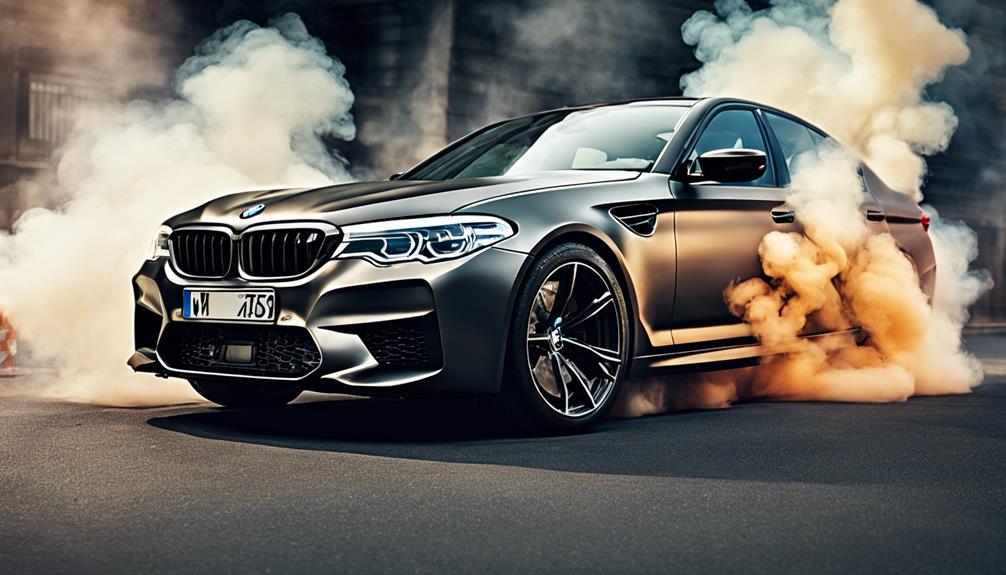
Consider optimizing the fuel efficiency of your BMW M5 through strategic driving habits and regular maintenance practices. Here are four ways to make the most out of your high-performance vehicle while saving on fuel:
- Smooth Acceleration: Gentle acceleration not only enhances the driving experience but also helps conserve fuel. Avoid sudden bursts of speed and opt for a gradual increase in velocity to improve fuel efficiency.
- Proper Tire Maintenance: Ensuring that your tires are properly inflated and aligned can have a substantial impact on fuel efficiency. Underinflated tires create more resistance, leading to increased fuel consumption.
- Regular Engine Tune-Ups: Keeping up with scheduled maintenance, such as changing air filters and spark plugs, can optimize engine performance and fuel efficiency. A well-maintained engine operates more efficiently, translating to better mileage.
- Utilize Cruise Control: When driving on the highway, using cruise control can help maintain a constant speed, which often results in better fuel efficiency compared to fluctuating speeds.
Popular F10 M5 Choice
To fully appreciate the allure of the F10 M5, one must understand its reputation for blending raw power with customizable performance enhancements. The F10 M5 is equipped with a twin-turbo 4.4-liter S63 V8 engine, offering a horsepower range of 553 to 567. Enthusiasts flock to this model for its tuning potential, with upgrades available to boost performance by an additional 60 to 120 horsepower. Popular modifications for the F10 M5 include intake and exhaust enhancements, providing drivers with the ability to tailor their driving experience. Suspension upgrades are also prevalent, allowing for improved handling and optimized performance on both road and track. With the capability for modifications pushing the F10 M5 to reach up to 1,000 horsepower, it's a top choice for those seeking extreme performance capabilities.
| Features | Details | Benefits |
|---|---|---|
| Twin-Turbo V8 Engine | 4.4-liter S63 engine with 553-567 horsepower | Impressive power output |
| Customizable Upgrades | Tuning options for additional 60-120 horsepower | Enhanced performance |
| Intake and Exhaust Enhancements | Popular modifications for personalized driving | Customized driving experience |
| Suspension Upgrades | Improved handling and performance optimization | Enhanced driving dynamics |
| Extreme Performance Capabilities | Potential for up to 1,000 horsepower with mods | Appeals to performance enthusiasts |
Frequently Asked Questions
What Are the Most Common Faults With BMW M5?
You'll encounter various issues with your BMW M5, like rod bearing failures, Vanos pump/solenoid troubles, and SMG clutch problems. Keep an eye out for power loss, rough shifting, and oil leaks. Stay proactive with maintenance!
How Reliable Is the BMW M5?
You'll find the BMW M5 to be a reliable choice, especially in later models like 2008 and newer. With improvements addressing past issues, owners report positive experiences. Balancing performance and maintenance costs, the M5 impresses.
How Long Do M5 Engines Last?
M5 engines are robust, often surpassing 200,000 miles with care. Regular maintenance, quality oil changes, and addressing issues promptly can prolong engine life. Factors like driving habits and maintenance history influence longevity.
Is the BMW M5 an Everyday Car?
Yes, the BMW M5 is an exceptional choice for your everyday car. Its blend of comfort, performance, and technology make it a versatile option that can handle your daily driving needs with style and ease.
Conclusion
So there you have it, the common problems with the BMW M5.
From expensive replacement parts to oil leaks and suspension clunks, it's important to be aware of these issues before diving into ownership.
Despite these challenges, the M5 remains a popular choice for enthusiasts looking for a high-performance sedan.
Just remember to stay on top of maintenance and be prepared for any potential headaches along the way.
Happy driving!





